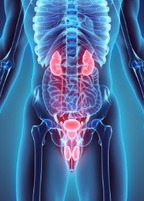Announcements

Current & archive
Strategies for reducing weight stigmatisation towards people with overweight or obesity in the healthcare system
Every second person who is overweight or obese is generally affected by stigmatisation due to their body weight. The healthcare sector is cited as one of the most common causes. As a result, the affected patients may receive incorrect or no diagnoses and therapies, avoid examinations and suffer health consequences such as further weight gain. Through a systematic literature search, various guideline-based recommendations for reducing weight stigma towards overweight and obese people in healthcare settings were identified. Further, available evidence for investigated interventions was analysed.
Publication: HTA Project Report No. 160: https://eprints.aihta.at/1547/
Contact: Sarah Wolf
Oncological Breast Cancer Care in Selected European Countries- Cross-sectoral cancer care models
The increasing incidence and prevalence of cancer, particularly breast cancer, presents substantial challenges for the Austrian healthcare system. The current hospital-centred care delivery model contributes to escalating costs and suboptimal resource utilisation.
A comprehensive analysis of cancer care models across six European countries (Austria [AT], Germany [DE], Denmark [DK], Sweden [SE], Netherlands [NL], Belgium [BE]) was conducted through structured literature review, expert consultations (n=17), and data synthesis, focusing specifically on breast cancer care. Analysis of healthcare infrastructures and cross-sectoral care approaches throughout the patient journey identified three distinct models: centralised specialist models (AT, BE, DK) characterised by highly specialised centres with strict volume requirements; decentralised care (DE) featuring distributed hospital structures in the in- and outpatient setting; and network-based integrated care (NL, SE) combining specialist centres with regional care delivery. These models demonstrate considerable variations in their utilisation of inpatient, outpatient, and home-based care services. While these models reflect varying degrees of centralisation and specialisation, they all aim to ensure high-quality care through regulation, accreditation and collaboration, with countries combining elements of different models based on their national cancer strategy and healthcare infrastructure.
For Austria, implementing a gradual transition towards a more decentralised or network-based model could potentially alleviate pressure on hospital resources while enhancing quality of care. However, successful implementation necessitates appropriate infrastructure, qualified healthcare professionals, and effective cross-sectoral coordination. Key challenges include addressing workforce shortages and overcoming fragmented data integration across healthcare sectors.
Publication: HTA Project Report No. 162: https://eprints.aihta.at/1545/
Contact: Nicole Grössmann-Waniek
Mental health screening of adults in primary care
With approximately one in five Austrian adults affected by mental illness annually, primarily depression (10%), anxiety disorders (7%), and substance use disorders (12%), screening in primary care settings could help identify and treat affected individuals early. Based on systematic reviews and evidence-based guidelines, this report analyses the evidence for mental health screening in primary care, identifies available screening tools, and discusses the requirements for implementing screening.
Publication: HTA Project Report No. 159: https://eprints.aihta.at/1544
Contact: Julia Kern
Horizon Scanning in Oncology - Fact Sheets
We are pleased to introduce you seven new Fact Sheets.
Fact Sheet Nr. 184 (July 2024)
Toripalimab (Loqtorzi®) in combination with cisplatin and gemcitabine for the first-line treatment of recurrent, not amenable to surgery or radiotherapy, or metastatic nasopharyngeal carcinoma (NPC)
Fact Sheet Nr. 185 (July 2024)
Toripalimab (Loqtorzi®) with cisplatin and paclitaxel for the first-line treatment of unresectable advanced, recurrent, or metastatic oesophageal squamous cell carcinoma (OSCC)
Fact Sheet Nr. 186 (July 2024)
Zolbetuximab (Vyloy®) with chemotherapy for the first-line treatment of locally advanced unresectable or metastatic HER2?negative gastric or gastro-oesophageal junction (GEJ) adenocarcinoma
Fact Sheet Nr. 187 (July 2024)
Encorafenib (Braftovi®) in combination with binimetinib (Mektovi®) for the treatment of advanced non-small cell lung cancer (NSCLC)
Fact Sheet Nr. 188 (July 2024)
Pembrolizumab (Keytruda®) with enfortumab vedotin (Padcev®) for the first-line treatment of unresectable or metastatic urothelial carcinoma
Fact Sheet Nr. 189 (July 2024)
Amivantamab (Rybrevant®) in combination with carboplatin and pemetrexed for the treatment of advanced non-small cell lung cancer (NSCLC)
Fact Sheet Nr. 190 (July 2024)
Atezolizumab (Tecentriq®) as monotherapy for the first-line treatment of advanced NSCLC
Uptake of Mental Health Benefits in Women Before and During the Perinatal Period: An Analysis of Austrian Health Insurance Data
On average, one in five women suffer from a mental illness during the perinatal period (pregnancy up to 1 year after birth. So far, it has been unknown how many women claim mental health services during this period. The analysis of pseudonymised insurance data revealed that around 20% of women in Austria who gave birth in 2017 and 2018 used at least one of five examined mental health services during the perinatal period. However, very few specialised perinatal mental health services are available in Austria, with regional disparities. The quality of existing services should be evaluated, and gaps in care need to be closed.
Publication: HTA Project Report No. 154: https://eprints.aihta.at/1535/
Contact: Ingrid Zechmeister-Koss
Horizon Scanning in Oncology - Fact Sheets
We are pleased to introduce you four new Fact Sheets.
Fact Sheet No. 180 (June 2024)
Erdafitinib (Balversa®) as monotherapy for the treatment of unresectable or metastatic urothelial carcinoma (UC)
Fact Sheet No. 181 (June 2024)
Odronextamab (Ordspono®) as monotherapy for the treatment of relapsed or refractory follicular lymphoma (r/r FL) or diffuse large B?cell lymphoma (r/r DLBCL)
Fact Sheet No. 183 (June 2024)
Epcoritamab (Tepkinly®) as monotherapy for the treatment of relapsed or refractory follicular lymphoma (FL)
Stereotactic radiotherapy, proton therapy and irreversible electroporation for the treatment of localised prostate cancer
This update report assesses three alternative treatments to radical therapies for localised prostate cancer (PCA): irreversible electroporation (IRE) uses electrode needles to target and destroy carcinoma tissue; stereotactic radiation therapy (SBRT) and proton therapy (PT) are forms of external beam radiation therapy, SBRT delivers high dose radiation in fewer fractions than conventional or moderate fractionation radiation, while PT delivers high-dose ionizing radiation with great precision.
The current evidence remains insufficient to conclude that IRE, SBRT, and PT improve outcomes in terms of survival and quality of life, as well as the avoidance of radical invasive procedures like prostatectomy, compared to conventional therapies. Recent RCTs on SBRT show minor differences in survival rates compared to conventional fractionation radiation in low- and intermediate-risk PCa. Further research is necessary for definitive conclusions.
Publication: Project Report No.: 107/1. Update: https://eprints.aihta.at/1530/
Contact: Judit Erdös
Evaluation of individual medical procedures - Reports 2024
We are pleased to introduce our new reports.
Decision Support Documents 2024:
- DSD 139: Caval valve implantation for severe tricuspid regurgitation https://eprints.aihta.at/1525
- DSD 140: Electroconvulsive therapy in treatment-resistant depression and treatment-resistant schizophrenia https://eprints.aihta.at/1526
- DSD 141: Thermoablation for benign thyroid nodules https://eprints.aihta.at/1527
+ 2 Updates
- DSD 24: Percutaneous transluminal coronary angioplasty (PTCA) with drug-eluting balloon (DEB) in patients with coronary artery disease (CAD). 3. Update 2024 https://eprints.aihta.at/1528
- DSD 45: Renal denervation (RDN) in patients with treatment resistant hypertension. 2. Update 2024 https://eprints.aihta.at/1529
Point of Care Tests (POCT): D-Dimer and Troponin. Update 2024
Point of care tests (POCTs) for troponin (Tn) and D-Dimer enable rapid diagnostics near patients. Tn-POCTs are used when there is a suspicion of acute coronary syndrome (ACS) and D-Dimer-POCTs are used when there is a suspicion of venous thromboembolism (VTE).
The aim of this report is to evaluate the clinical utility of the two POC diagnostics, D-Dimer and troponin, in primary care.
Publication: HTA Project Report No. 124, 1. Update 2024: https://eprints.aihta.at/1524/
Contact: Claudia Wild
Horizon Scanning in Oncology - Fact Sheets
We are pleased to introduce you three new Fact Sheets.
Fact Sheet No. 177 (May 2024)
Sugemalimab (Cejemly®) with platinum-based chemotherapy for the first?line treatment of metastatic non-small-cell lung cancer (NSCLC)
Fact Sheet No. 178 (May 2024)
Osimertinib (Tagrisso®) with pemetrexed and platinum-based chemotherapy for the first-line treatment of advanced non-small cell lung cancer (NSCLC)
Fact Sheet No. 179 (May 2024)
Tislelizumab (Tevimbra®) monotherapy or in combination with chemotherapy for the treatment of locally advanced or metastatic non-small cell lung cancer (NSCLC)

























